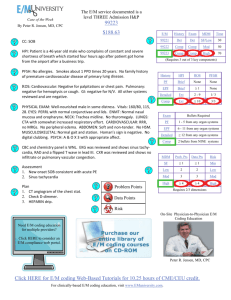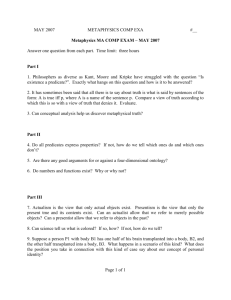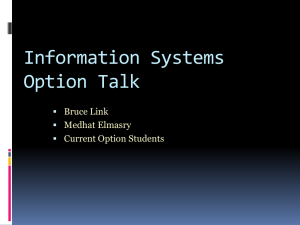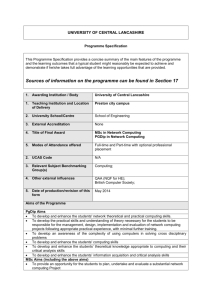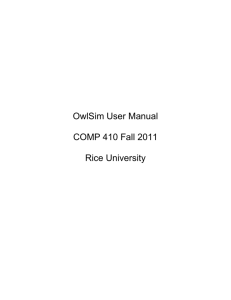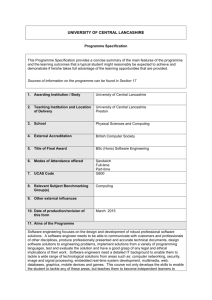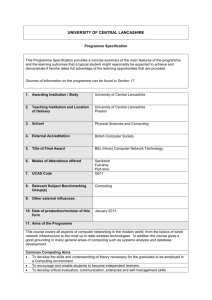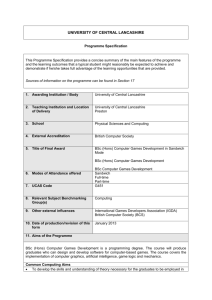Programme Specification
advertisement
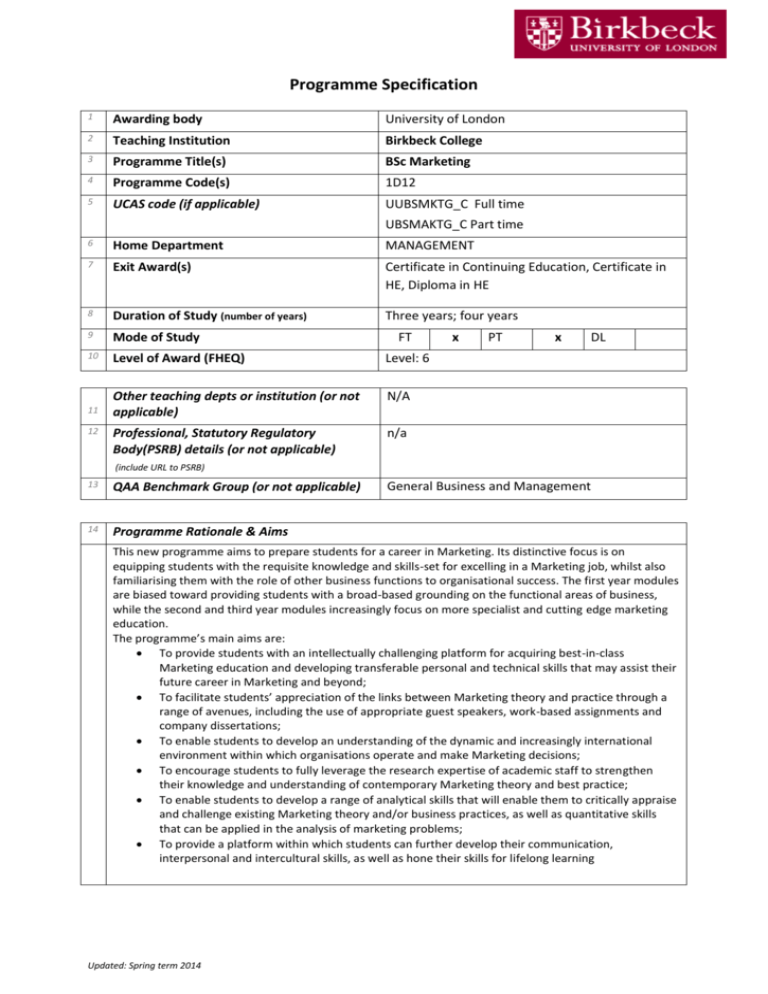
Programme Specification 1 Awarding body University of London 2 Teaching Institution Birkbeck College 3 Programme Title(s) BSc Marketing 4 Programme Code(s) 1D12 5 UCAS code (if applicable) UUBSMKTG_C Full time UBSMAKTG_C Part time 6 Home Department MANAGEMENT 7 Exit Award(s) Certificate in Continuing Education, Certificate in HE, Diploma in HE 8 Duration of Study (number of years) Three years; four years 9 Mode of Study 10 Level of Award (FHEQ) Level: 6 Other teaching depts or institution (or not applicable) N/A 11 Professional, Statutory Regulatory Body(PSRB) details (or not applicable) n/a 12 FT x PT x DL (include URL to PSRB) 13 QAA Benchmark Group (or not applicable) 14 Programme Rationale & Aims General Business and Management This new programme aims to prepare students for a career in Marketing. Its distinctive focus is on equipping students with the requisite knowledge and skills-set for excelling in a Marketing job, whilst also familiarising them with the role of other business functions to organisational success. The first year modules are biased toward providing students with a broad-based grounding on the functional areas of business, while the second and third year modules increasingly focus on more specialist and cutting edge marketing education. The programme’s main aims are: To provide students with an intellectually challenging platform for acquiring best-in-class Marketing education and developing transferable personal and technical skills that may assist their future career in Marketing and beyond; To facilitate students’ appreciation of the links between Marketing theory and practice through a range of avenues, including the use of appropriate guest speakers, work-based assignments and company dissertations; To enable students to develop an understanding of the dynamic and increasingly international environment within which organisations operate and make Marketing decisions; To encourage students to fully leverage the research expertise of academic staff to strengthen their knowledge and understanding of contemporary Marketing theory and best practice; To enable students to develop a range of analytical skills that will enable them to critically appraise and challenge existing Marketing theory and/or business practices, as well as quantitative skills that can be applied in the analysis of marketing problems; To provide a platform within which students can further develop their communication, interpersonal and intercultural skills, as well as hone their skills for lifelong learning Updated: Spring term 2014 15 Entry Criteria Applicants under 21 require a minimum of three ‘A’ levels CCC or equivalent to 240 Tariff points. IB 24. All other students may be admitted as mature students based on their qualifications, skills, or relevant experience which may include: - Any level 3 qualification (Such as A-level or Access to HE Diploma, NVQ Level 3 etc) - Relevant work experience Applicants will normally be expected to have grade ‘C’ GSCE level English and Maths. Applicants who do not hold this level of qualification may be required to carry out a skills audit at a selection evening, which comprises Maths and English. This audit assesses an applicant’s potential to cope with and benefit from a particular programme of study. Some applicants may be advised to take the Cert HE Management or Cert HE Introductory Studies (Business Pathway) or any Access to HE course or equivalent at a Further Education College before re-applying to the BSc Marketing. 16 Learning Outcomes Upon the successful completion of this programme students should be able to: Subject Specific 1. Demonstrate knowledge and understanding of the contexts in which Marketing management takes place; 2. Demonstrate knowledge and understanding of Marketing theory, principles and concepts; 3. Understand the practice and language of Marketing; 4. Evaluate and critically appraise Marketing management practices; 5. Understand and evaluate recent developments in Marketing research and practice; Intellectual 6. Approach problems systematically and to present reasoned responses; 7. Read and synthesise literature; 8. Formulate testable hypotheses; 9. Formulate and pursue research problems; 10. Adopt a broad and informed approach to a range of policy related problems; 11. Demonstrate cognitive skills including the capacity to critically evaluate arguments and evidence; 12. Use quantitative and qualitative data in problem solving; 13. Structure and communicate ideas effectively; 14. Demonstrate the capacity for independent and self-managed learning; Practical 15. Demonstrate a range of library skills; 16. Demonstrate essay writing skills 17. Demonstrate IT skills 18. Locate, extract and analyse data 19. Present data in a variety of formats and to a variety of audiences Personal and Social 20. Demonstrate well developed communication (oral and written) skills 21. Work in teams 22. Improve interpersonal skills 23. Apply decision making skills Updated: Spring term 2014 17 Learning, teaching and assessment methods The programme of study has been designed so that as well as receiving information in the form of formal lectures, a student can take charge of their own learning by adopting a participative approach to learning. The tutorial/seminar sessions allow students to interact with their peers and develop insights into analysing and interpreting a wide and varied subject matter. Students will develop their intellectual capability through arguments; learn how to question existing knowledge and approaches; develop a critical appreciation of the subject matter; improve their communicative style; and develop their interpersonal skills. This programme is assessed through a range of assessment methods. Modules that emphasise the learning of numerical skills lean toward the use of mid-term tests coupled with unseen, formal examination at the end of each term. Mid-term tests are short tests set during the term and are designed to provide early feedback on performance. Other modules use individual or group presentations, written essays, or formal end of term examinations, as sole assessments or in combination. In the final year of studies, students independently design and complete a large written assignment, in the form of a research project/dissertation. Assessment Format for each year; FT Year 1 – 70% exam, 30% coursework Year 2 – 70% exam, 30% coursework Year 3 – 70% exam, 30% coursework PT Year 1 – 70% exam, 30% coursework Year 2 – 70% exam, 30% coursework Year 3 – 70% exam, 30% coursework Year 4 – 70% exam, 30% coursework 18 Programme Description BSc Marketing Full-Time 3 year Year 1 Introductions: Understanding the Business World Data Analysis for Business Marketing Simulation Marketing Principles and Practice Financial Accounting Organisational Behaviour Microeconomics for Business Year 2 Buyer Behaviour Marketing Communications Sustainability and Stakeholder Marketing Digital Marketing Management of Innovation Updated: Spring term 2014 Marketing Research 1 x30 credit or 2 x15 credit Options from range of Level 5 Management modules Year 3 Marketing Strategy Strategic Brand Management Marketing Project 2 x15 credit Options from; Services and Retail Marketing, Sports Marketing, B2B Marketing, International Marketing BSc Marketing Part-Time 4 year Year 1 Introductions: Understanding the Business World Data Analysis for Business Marketing Simulation Marketing Principles and Practice Financial Accounting Year 2 Organisational Behaviour Microeconomics for Business Buyer Behaviour Marketing Communications Digital Marketing Sustainability and Stakeholder Marketing Year 3 Management of Innovation Marketing Research Strategic Brand Management Options (to 45 credits) from range of Level 5 Management modules Year 4 Marketing Strategy Marketing Project 1 x15 credit Options from; Services and Retail Marketing, Sports Marketing, B2B Marketing, International Marketing Updated: Spring term 2014 19 Programme Structure BSc Marketing Full-Time 3 year Year 1 Level 4 4 4 5 5 5 5 Year 2 Level 5 5 5 5 6 6 5/6 Year 3 Level 6 6 6 5 5 5 5 Module Code SSEA025S4 Module Title Understanding the Business Status Comp Credits Comp Comp Comp Comp Comp Comp 15 15 15 15 15 15 BUMN051H4 BUMN101H4 MOMN043H5 BUMN082H5 MOMN047H5 MOMN012H5 Introductions: World Data Analysis for Business Marketing Simulation Marketing Principles and Practice Financial Accounting Organisational Behaviour Microeconomics for Business Module Code BUMN067H5 BUMN093H5 BUMN097H5 BUMN104H5 MOMN060H6 BUMN095H6 Various Module Title Buyer Behaviour Marketing Communications Sustainability and Stakeholder Marketing Digital Marketing Management of Innovation Marketing Research Options from Management range of modules Status Comp Comp Comp Comp Comp Comp Option Credits 15 15 15 15 15 15 30 Module Code MOMN044H6 BUMN065H6 BUMN108D6 BUMN096H5 BUMN105H5 BUMN102H5 BUMN094H5 Module Title Marketing Strategy Brand Development Marketing Project Services and Retail Marketing Sports Marketing B2B Marketing International Marketing Status Comp Comp Core Option Option Option Option Credits 15 15 60 15 15 15 15 Status Comp Credits Comp Comp Comp Comp 15 15 15 15 Status Comp Comp Comp Comp Credits 15 15 15 15 30 BSc Marketing Part-Time 4 year Year 1 Level 4 4 5 5 4 Year2 Level 5 5 5 5 Module Code SSEA025S4 Module Title Understanding the BUMN051H4 MOMN043H5 BUMN082H5 BUMN101H4 Introductions: World Data Analysis for Business Marketing Principles and Practice Financial Accounting Marketing Simulation Module Code MOMN047H5 MOMN012H5 BUMN067H5 BUMN093H5 Module Title Organisational Behaviour Microeconomics for Business Buyer Behaviour Marketing Communications Updated: Spring term 2014 Business 30 5 5 Year 3 Level 6 6 6 5/6 BUMN097H5 BUMN104H5 Sustainability and Stakeholder Marketing Digital Marketing Module Title Management of Innovation Marketing Research Brand Development Options from Management range of modules AND 15 credits of options from the following: 5 BUMN096H5 Services and Retail Marketing 5 BUMN105H5 Sports Marketing 5 BUMN102H5 B2B Marketing 5 BUMN094H5 International Marketing Year 4 Level Module Code Module Title 6 MOMN044H6 Marketing Strategy 6 BUMN108D6 Marketing Project 5 BUMN096H5 Services and Retail Marketing 5 BUMN105H5 Sports Marketing 5 BUMN102H5 B2B Marketing 5 BUMN094H5 International Marketing 20 Module Code MOMN060H6 BUMN095H6 BUMN065H6 Various Comp Comp 15 15 Status Comp Comp Comp Option Credits 15 15 15 30 Option Option Option Option 15 15 15 15 Status Comp Core Option Option Option Option Credits 15 60 15 15 15 15 Regulations Admissions This programme adheres to the College Admissions Policy http://www.bbk.ac.uk/mybirkbeck/services/rules/Admissions%20Policy.pdf/view If the programme has additional information re: Admissions please state here: (or not applicable) N/A Credit Transfer Accredited Prior Learning will be considered in line with the College Policy on Accredited Prior Learning http://www.bbk.ac.uk/mybirkbeck/services/rules/AccreditedPriorLearning.pdf Programme Regulations This programme adheres to the College Common Awards Scheme http://www.bbk.ac.uk/mybirkbeck/services/rules/casregs.pdf Programme Specific Regulations (or not applicable) N/A 21 Student Support and Guidance All Birkbeck students have access to a range of student support services, details can be found on our website here: http://www.bbk.ac.uk/mybirkbeck/services/facilities Updated: Spring term 2014 22 Methods of Enhancing Quality and Standards The College has rigorous procedures in place for the monitoring and enhancing its educational provision. This includes regular monitoring of programmes drawing on feedback from various sources including external examiner's reports, student feedback, student achievement and progression data. In addition, departments are reviewed every four to five years through the internal review process that includes external input. For more information please see the Quality Enhancement and Validation website www.bbk.ac.uk/qev 23 Programme Director Nicholas Pronger 24 Start Date (term/year) Oct 2015 25 Date approved by TQEC Spring 2014 26 Date approved by Academic Board Summer 2014 27 Date(s) updated/amended Spring Term 2015 Updated: Spring term 2014
